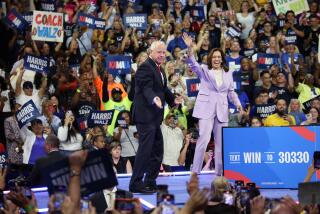The ‘90s Could End Up Being Nice Surprise
- Share via
Prepare to hear economic promises--if predictably little economic wisdom--as the Democratic convention opens this week in Atlanta, the Republicans convene Aug. 15 in New Orleans and both parties start campaigning in high gear on Labor Day, Sept. 5.
The convention themes, with variations, will be election-year standards. Michael Dukakis will talk about improving education, expanding day care, boosting industrial research, cutting defense spending and rebuilding America’s infrastructure. George Bush will talk about improving education, encouraging child care, boosting industrial research, making defense spending efficient and reviving the space program.
But this year the $150-billion government budget deficit will play like a minor chord through the campaign rhetoric. No promise will be unaccompanied by a pledge of fiscal discipline. Both parties recognize the need to cut the deficit, especially as the United States has been selling Treasury bonds to foreigners to finance it. Neither party thinks it will be easy.
In fact, some politicians--and many uneasy voters--think that the tough measures necessary to cut the deficit will throw the economy into recession and cause history to see the next President as another Herbert Hoover--who took office in 1929 and bore the blame for the Great Depression.
But such gloom may well misread the future. The 1990s could turn out much better than today’s forecasts make out--as many economists are beginning to conclude as they watch business investment and exports replace consumer spending as the driving force of the economy. Charles Clough, investment strategist for the Merrill Lynch Capital Markets Group, which advises investing institutions worldwide, predicts that current fears about inflation--which caused interest rates to rise last week--will subside by the fall as consumer spending slows down. Then, he says, the U.S. economy could enter a sustained period of expanding industrial production and declining interest rates.
Savings Growth
Economist John Hekman of Claremont Economics Institute, which advises major corporations, agrees. Hekman says the 1990s will be the reverse of this decade in important ways. Where low savings are a problem now, they will show enormous growth--increasing $75 billion a year in the ‘90s. Why? Because one-third of the U.S. population--77 million people--are in the 25 to 44 age group and growing older. In the next decade, they will save where now they spend and thus help--along with a temporary but growing surplus in the Social Security Trust Fund--to eliminate the budget deficit and finance the nation’s needs.
It won’t be an untroubled decade. The consumer sector--housing and appliances, clothing, food and cars--comprises two-thirds of the whole U.S. economy. Cutting it back will mean layoffs and displacement in some industries. The aging of the population alone means fewer new home buyers and less home construction.
But the compensating factor is that business investment and exports are what economists call multipliers--every dollar invested adds more than a dollar to gross national product in new jobs, production and industries. Change is inevitable, recession is not.
To be sure, the next President will have to be diligent about reducing the deficit--failing to do so would undermine confidence in the dollar and cause grave problems for the entire world economy.
But that doesn’t mean such social needs as child care and infrastructure repair must be forgone. It simply means that private investment rather than government finance may do the job; there will be money in private markets for those smart enough to devise ways to tap it. New Jersey’s Sen. Bill Bradley, for example, is already talking of innovative mortgage funds to finance low- and moderate-income housing. Both Dukakis and Bush talk easily of financing public needs with private investment.
Truth is, if the next President demonstrates decisiveness on the budget, he has a chance not only to avoid the fate of Herbert Hoover but to lead the United States into a new and hopeful decade--different from the one you’ll hear about from now to Election Day, Nov. 8.
More to Read
Get the L.A. Times Politics newsletter
Deeply reported insights into legislation, politics and policy from Sacramento, Washington and beyond. In your inbox twice per week.
You may occasionally receive promotional content from the Los Angeles Times.










